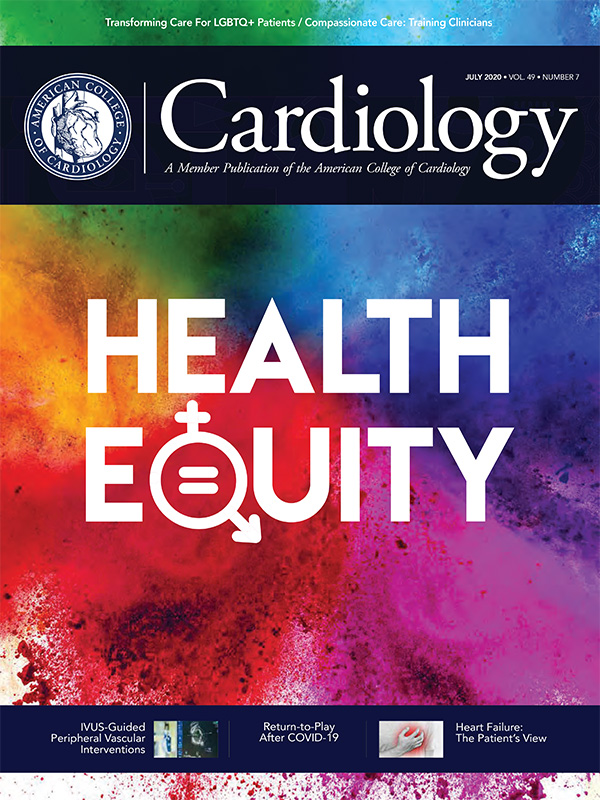Pulse of ACC | ACC Denounces Racism, Violence; Roundtable and Patient Forum on COVID-19; More
Quick Reads
ACC Denounces Racism, Violence; Roundtable and Patient Forum on COVID-19; More.
ACC and Heartbeat Join Forces Around Telehealth

ACC and Heartbeat Health, the first telemedicine and virtual care platform built by cardiologists for cardiologists, are joining forces to transform telehealth into comprehensive virtual care by ensuring cardiology practices around the world can incorporate clinical data into virtual patient communications to make real-time, informed clinical care decisions.
"To truly transform cardiovascular care and improve heart health, we must incorporate data, remote patient monitoring and outcome tracking in an easy to use format both the patient and the physician can use to inform shared decision-making," says ACC Chief Innovation and Science and Quality Officer John S. Rumsfeld, MD, PhD, FACC. "Wearable health monitoring devices have evolved rapidly over the last five to 10 years and are now widely available; COVID-19 is a catalyst to push remote patient monitoring into the virtual care workflow."
Heartbeat Health offers a virtual cardiovascular management solution where the smartphone is at the core. By combining health risk assessment and device data with a robust telehealth platform, Heartbeat Health more completely connects patients to their clinicians. The results: a tailored treatment plan for patients across all stages of heart and vascular disease and sites of service including the hospital, skilled nursing, cardiac rehabilitation and the home.
Through the Heartbeat Health platform, wireless monitoring devices can stream key metrics in real-time to cloud-based artificial intelligence engines that flag potential health risks, like blood pressure changes or volume status in heart failure, so clinicians can intervene with patients via HIPAA-compliant two-way video before conditions worsen.
"Cardiologists in solo, group, and system practices will be leaders in making health care far more convenient, cost-effective and outcomes-driven," said Heartbeat Health CEO Jeffrey D. Wessler, MD, MPhil, FACC. "We're thrilled to be working with the College … to set a new standard for telehealth and specialized virtual care."
JACC Journals Among Top 12 Cardiovascular Journals Worldwide

The newly released 2019 Journal Citation Report for Cardiac and Cardiovascular Systems ranks JACC, JACC: Cardiovascular Interventions, JACC: Heart Failure and JACC: Cardiovascular Imaging in the top 12 among all 141 English-language cardiovascular journals.
Additionally, JACC is celebrating an impressive threshold, passing an Impact Factor of 20 and an overall rank of third among cardiovascular journals worldwide. The JACC publishing team thanks the editors and authors for their ongoing commitment to advancing cardiovascular research around the globe.
Learn more about the growing JACC Journals family at JACC.org.
Survey Shows Wide Variation in Parental Leave Policies During Training

Results from a 2019 ACC survey of CVD Program Directors highlight the need to clarify personal leave policies, develop shared personal leave models, encourage program support, and emphasize parental wellness in order to improve diversity and wellness withing the profession.
"Approaches to new parenthood in graduate medical education (GME) are under increased scrutiny," write Julie B. Damp, MD, FACC, Michael W. Cullen, MD, FACC, Victor Soukoulis, MD, FACC, et al., in a letter published in JACC that outlines the survey results. According to Damp and colleagues, a wide variation in parental leave policies exist across cardiovascular training programs – a factor that could impact perceptions of – and participation in – cardiovascular programs and specialties.
Specifically, the survey found a higher percentage of small programs had no fellows take personal leave in the last three years and that in programs where fellows have taken leave, 51% of women took less than two months and 79% of men took one to three weeks.
The authors suggest that "creatively utilizing coverage resources, allowing flexible scheduling, and creating a supportive culture can minimize pressure fellows may feel to take less personal leave than they would otherwise choose." Doing this could increase consistency and support for programs and program directions, improve parental and clinician well-being, and foster diversity and inclusion in the profession over the long term, they add.
With clinician well-being and diversity and inclusion two major strategic priorities for the ACC, Cardiology wants to hear from you regarding your experiences with parental leave and/or your thoughts on what you would like to see in a parental leave model.
Email cardiologyeditor@acc.org or share your thoughts on Twitter using #CardiologyMag and tagging @AccinTouch.
ACC, Society for Vascular Surgery to Collaborate on Single Vascular Registry

The ACC and Society for Vascular Surgery (SVS) have announced that ACC's PVI Registry will collaborate with the SVS Vascular Quality Initiative to support and steer a single vascular registry. Effective January 2021, the new registry will be operated by SVS, creating a co-branded VQI program focused on measuring and improving the care for the growing population of patients with vascular diseases.
"The ACC is committed to working with all of our partners in cardiovascular care to create a cohesive source of vascular disease data," says ACC President Athena Poppas, MD, FACC. "In combining our registry with that of SVS, we are providing uniform, actionable information for physicians and health systems."
The new registry collaboration will provide greater opportunities to evaluate new and emerging technologies, pharmacologic therapies, and medical and lifestyle management. It will also provide a rich source of data for academicians, the Food and Drug Administration and industry looking to answer scientific questions about patient characteristics and outcomes, as well as the use and effectiveness of different treatments.
"The combined strengths of ACC and SVS will provide a clear choice for clinicians, researchers, industry and the Food and Drug Administration when looking for data on the management of vascular diseases," says Fred Masoudi, MD, MPH, FACC, NCDR Management Board chair and chief scientific adviser.
The existing PVI Registry will continue to operate and accept patient discharges through Dec. 31. The PVI Registry will not enroll new hospitals for 2021. The data collection tool will remain open through April 15, 2021, to allow sites to complete data entry for Q4 2020 and receive a final 2020 outcomes report.
Hospitals will be able to access their historical PVI Registry data through Dec. 31, 2021, allowing hospitals time to determine how they would like to store or transfer these past records and reports.
Expert Consensus Decision Pathway Addresses Bleeding Management in Patients on OACs

The ACC's new 2020 Expert Consensus Decision Pathway on Management of Bleeding in Patients on Oral Anticoagulants focuses on acute bleeding management in patients being treated with direct oral anticoagulants (DOACs) or vitamin K antagonists (VKAs) for any indication.
Led by Writing Committee Chair Gordon F. Tomaselli, MD, FACC, and Vice Chair Kenneth W. Mahaffey, MD, FACC, the document builds on the 2017 ACC Expert Consensus Decision Pathway for Periprocedural Management of Anticoagulation in Patients With Nonvalvular Atrial Fibrillation by providing guidance for new OACs used in the prevention of venous thromboembolism (VTE) and new reversal strategies for factor Xa (FXa) inhibitors.
Specifically, the new pathway offers recommendations for temporary or permanent interruption of therapy, general approaches to bleeding management, decision support for treatment with a reversal agent, and indications and timing for reinstituting anticoagulant treatment.
"Irrespective of severity, local measures should be employed where possible to control any bleeding," Tomaselli and Mahaffey write. For major bleeding management, the writing committee does not recommend routine administration of platelets for patients on antiplatelet agents, although this can be considered in specific cases, particularly when other measures, such as OAC reversal, have failed.
For nonmajor bleeding, the committee does not recommend routine OAC reversal but notes that it may be advisable to temporarily discontinue OAC treatment until the patient is clinically stable and hemostasis is achieved.
When there is an ongoing indication for OAC, the clinician should undertake a risk-benefit assessment that involves other practitioners, such as surgeons, interventionalists and neurologists, the document notes. In addition, the decision to restart anticoagulation therapy should involve shared decision-making with patients and caregivers.
Tomaselli and Mahaffey note "large gaps in knowledge" regarding treatment of patients who experience bleeding complications during OAC therapy. "It is anticipated that as the population continues to age, more people will be treated with OACs," they write. Going forward, the expert consensus document will need "further refinement" as research and clinical practice lead to additional data, they conclude.
The pathway is published in JACC.ACC, SBC Address Role of Women in Cardiovascular Practice, Research in Brazil

The ACC and the Sociedade Brasileira de Cardiologia (SBC) brought together leading women from the U.S. and Brazil this month for a focused webinar addressing the challenges and opportunities facing female cardiologists in Brazil and the rest of the region.
ACC leaders, including ACC President Athena Poppas, MD, FACC, ACC Vice President Dipti Itchhaporia, MD, FACC, and ACC Board of Trustees member Roxana Mehran, MD, FACC, participated in several sessions during the all-day webinar. Other speakers included pioneering female cardiologist Nanette Wenger, MD, MACC, and Gláucia Maria Moraes de Oliveira, PhD, FACC. Topics included strategic leadership in times of change; mentorship beyond borders; and how to ensure vitality and enthusiasm across your career.
The webinar is the first in a monthly series in Brazil. Future webinars will address topics like heart failure and cardio-oncology. Stay on top of all the ACC's global activities at ACC.org/GlobalHub.
Clinical Topics: Anticoagulation Management, Arrhythmias and Clinical EP, Cardiovascular Care Team, COVID-19 Hub, Dyslipidemia, Pulmonary Hypertension and Venous Thromboembolism, Anticoagulation Management and Atrial Fibrillation, Anticoagulation Management and Venothromboembolism, Atrial Fibrillation/Supraventricular Arrhythmias, Lipid Metabolism, Novel Agents
Keywords: ACC Publications, Cardiology Magazine, Racism, Workflow, Parental Leave, Journal Impact Factor, Decision Making, COVID-19, severe acute respiratory syndrome coronavirus 2, Cardiology, Education, Medical, Graduate, Telemedicine, Physicians, Factor Xa Inhibitors, Venous Thromboembolism, Atrial Fibrillation, Factor Xa, Trustees, Consensus, Mentors, Leadership, Hemorrhage, Anticoagulants, Vascular Diseases, Registries
< Back to Listings


